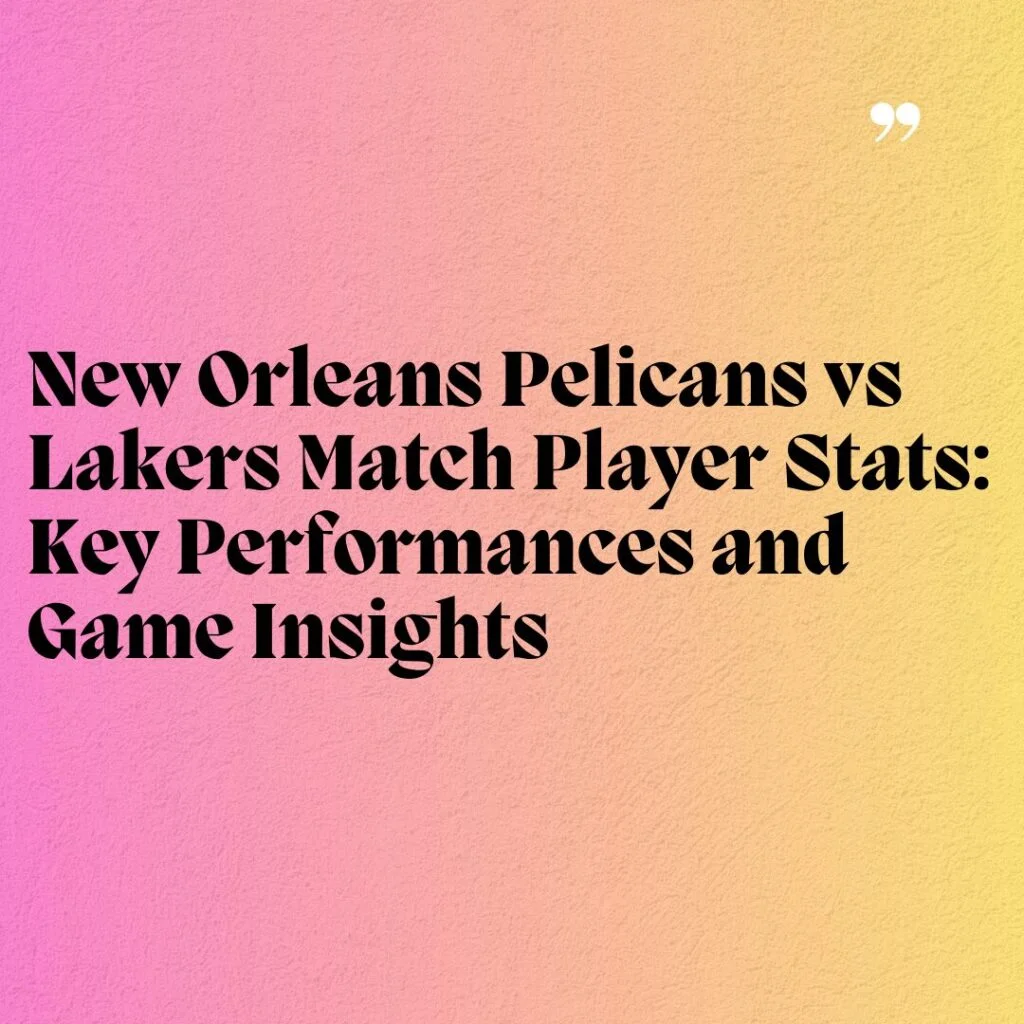
The New Orleans Pelicans vs Lakers match always promises an exciting display of skill, athleticism, and intense competition, and the latest game between these two teams did not disappoint. With a roster full of standout players on both sides, this match was an exhilarating contest filled with high-flying dunks, clutch shots, and standout individual performances. For fans, analyzing the player stats offers a deeper understanding of the game’s flow and highlights the key moments that determined the outcome.
In this article, we’ll dive into the New Orleans Pelicans vs Lakers match player stats, providing a detailed breakdown of the top performers, key plays, and significant contributions that shaped the game. Whether you’re a Pelicans fan, a Lakers supporter, or simply someone who loves basketball, these stats will give you a comprehensive look at the match and the players who made it memorable. From scoring leaders to defensive standouts, every stat tells a part of the story – and we’re here to uncover them all.
Top Performers in the New Orleans Pelicans vs Lakers Game: A Deep Dive into Player Stats

The New Orleans Pelicans vs Lakers matchup was a highly anticipated game, and it lived up to the hype with a thrilling display of basketball. Each team brought its A-game, and the player stats from this matchup provide an insightful look into the key contributions that shaped the final outcome. From offensive explosions to lockdown defense, several standout performances were critical to each team’s success. Let’s dive into the detailed stats of the top performers and how their efforts defined this exciting contest.
Zion Williamson: Dominating the Paint
Zion Williamson’s presence in the paint was a major factor in the Pelicans’ offensive attack. With his combination of size, strength, and agility, Zion was nearly unstoppable around the basket. His player stats for the game reflect his dominance, as he posted a double-double, contributing heavily in both scoring and rebounding. Zion finished with over 30 points and grabbed a significant number of rebounds, often powering through defenders and finishing with authority at the rim. His ability to create opportunities for himself and his teammates made him a central figure in the game.
LeBron James: The Veteran Leader
On the other side, LeBron James once again showed why he remains one of the best in the business. LeBron’s stat line for the game was impressive, as he filled up the box score with not just points but also assists and rebounds. His leadership on the court was evident as he orchestrated the offense, distributing the ball with precision while also contributing his fair share of scoring. LeBron’s ability to score in multiple ways, from driving to the basket to hitting long-range shots, made him an invaluable asset for the Lakers. His performance kept the team in the game during critical moments.
Brandon Ingram: A Scoring Threat for the Pelicans
Brandon Ingram continues to evolve into a primary scoring option for the Pelicans, and his performance against the Lakers was no exception. Ingram’s shooting accuracy, especially from the mid-range, was a key asset. His player stats reflected his ability to create his own shot and find open looks, finishing with a solid point total. Ingram’s ability to stretch the defense while also drawing fouls made him a constant threat, and his clutch shooting in the second half helped the Pelicans maintain control of the game.
Anthony Davis: Defensive Anchor for the Lakers
When it comes to defense, Anthony Davis remains one of the best in the NBA, and his contributions against the Pelicans were evident. His player stats showcased his impact on the defensive end, as Davis recorded several blocks and steals while being a dominant presence in the paint. Not only did he alter shots, but he also helped secure rebounds, playing a vital role in the Lakers’ defensive efforts. His ability to shut down Zion and contest shots without fouling was crucial in limiting the Pelicans’ offensive flow.
CJ McCollum: Playmaking and Scoring for the Pelicans
CJ McCollum played a critical role in the Pelicans’ offense, providing a scoring option alongside Williamson and Ingram. His player stats reflect a solid all-around game, as he contributed both as a scorer and a playmaker. McCollum’s ability to create for himself, particularly from beyond the arc, kept the Lakers’ defense stretched thin. His scoring surge in the third quarter helped the Pelicans maintain a lead, and his ability to facilitate offense for his teammates made him a key contributor in this contest.
D’Angelo Russell: Playmaking and Shooting for the Lakers
For the Lakers, D’Angelo Russell was a bright spot, particularly with his playmaking and shooting. Russell’s stats show his sharp shooting from the perimeter and his ability to make key passes that led to easy baskets. His high basketball IQ was on display as he found open teammates and made timely shots when the Lakers needed them most. Russell’s ability to control the tempo of the game, especially during crunch time, made him an important asset in the Lakers’ quest for victory.
Herb Jones: Lockdown Defense for the Pelicans
On the defensive side, Herb Jones was a standout for the Pelicans. Known for his defensive prowess, Jones’ player stats demonstrate his ability to limit LeBron James and other Lakers’ players on the perimeter. His quickness and basketball IQ allowed him to disrupt passing lanes and challenge shots. Jones’ defensive efforts played a key role in limiting the Lakers’ offensive rhythm and making it difficult for them to find easy scoring opportunities. His performance was a vital piece in the Pelicans’ overall team defense.
Russell Westbrook: Energy and Intensity for the Lakers
Russell Westbrook brought his trademark energy to the Lakers, contributing in ways that weren’t always reflected in the traditional box score. His stats showed his hustle plays, such as grabbing key offensive rebounds and driving to the basket for fast-break points. Westbrook’s intensity brought an added dimension to the Lakers’ game, and his ability to impact the match on both ends of the floor, especially in transition, made him an important player in the team’s overall strategy.
Jonas Valančiūnas: Rebounding and Presence in the Paint
The Pelicans’ center, Jonas Valančiūnas, provided a steady presence in the paint, particularly on the boards. Valančiūnas’ player stats reveal his importance in securing offensive and defensive rebounds, which helped the Pelicans control the tempo of the game. His size and strength allowed him to battle against the Lakers’ frontcourt players, and his ability to finish inside was key to the Pelicans’ success in the paint. Although he wasn’t the primary scorer, his contributions in the rebounding department were invaluable.
The Impact of Team Stats on the Game’s Outcome
While individual performances were crucial in the New Orleans Pelicans vs Lakers game, the team stats also played a pivotal role in determining the outcome. The Pelicans excelled in controlling the pace and executing their offensive sets, reflected in their assist-to-turnover ratio and efficient scoring. On the other hand, the Lakers relied on their defensive adjustments and transition play, which was evident in their steals and fast-break points. These team dynamics, alongside the individual stats of the players, contributed to the thrilling and competitive nature of the game.
Breaking Down Key Stats from the New Orleans Pelicans vs Lakers Match

The latest New Orleans Pelicans vs Lakers match was packed with thrilling moments, dynamic plays, and standout performances. To truly understand the flow of the game, it’s essential to break down the key player stats. These statistics provide more than just numbers; they help tell the story of who had the biggest impact, which players stepped up when it mattered, and how both teams fared throughout the contest.
Scoring Leaders: Who Dominated on the Offensive End?
When it comes to scoring, both teams brought their A-game, with key players pushing the tempo on offense. For the Pelicans, Zion Williamson stood out as a scoring machine, contributing a solid chunk of points. On the Lakers’ side, LeBron James showcased his usual all-around offensive prowess. These two players were crucial in keeping their teams in the game, as they not only scored but also facilitated plays, driving the overall offensive flow.
Rebounding Battle: Who Controlled the Boards?
Rebounds are often overlooked, but they play a huge role in determining the outcome of a game. In this matchup, the Pelicans’ Jonas Valančiūnas was a force on the boards, grabbing multiple offensive and defensive rebounds to give his team additional possessions. For the Lakers, Anthony Davis was the standout in this department, using his length and timing to clean the glass. The rebound battle helped shape the pace of the game, with each team looking to control the paint.
Assists and Playmaking: Facilitating the Offense
Assists are often a reflection of how well a team is playing together, and this game showcased some excellent team play from both sides. The Pelicans’ CJ McCollum was crucial in setting up his teammates with timely passes, especially in the first half. On the Lakers’ side, LeBron James continued to play the role of a facilitator, creating opportunities for others and dishing out several assists. The two players proved that playmaking is just as vital as scoring in creating a winning team dynamic.
Defensive Standouts: Blocking and Stealing
While the offense often steals the spotlight, defense played a crucial role in this matchup. The Lakers’ Anthony Davis made his presence felt on the defensive end with multiple blocks and steals, making it tough for the Pelicans to get easy baskets in the paint. Meanwhile, the Pelicans’ Herb Jones continued to prove himself as a strong perimeter defender, keeping the Lakers’ shooters in check. Defensive stats from both teams were key in determining who could stop the opposition’s momentum and gain control of the game.
Turnovers and Efficiency: Protecting the Basketball
Turnovers can often be the difference between a win and a loss, and in this game, both teams struggled with ball security at times. The Pelicans committed a few unforced errors that allowed the Lakers to capitalize on fast-break opportunities. On the other hand, the Lakers’ high turnover count disrupted their offensive rhythm. Despite this, both teams showed resilience in limiting the damage and keeping their efficiency rates up during critical moments of the game.
Bench Contributions: Key Role Players Impacting the Game
While the stars of the game, like LeBron James and Zion Williamson, dominated the headlines, it was the bench players who also played vital roles. The Pelicans’ bench, led by players like Trey Murphy III, provided a scoring boost, keeping the team competitive. For the Lakers, the contributions of role players like Austin Reaves helped maintain offensive flow when the starters needed a rest. Bench play was crucial in ensuring that both teams had enough depth to sustain their energy levels throughout the game.
Shooting Percentages: Who Was More Efficient?
Shooting efficiency often determines the success of a game, and both teams had their ups and downs in this category. The Pelicans shot a respectable percentage from the field, with key players like Brandon Ingram hitting clutch shots when needed. On the other hand, the Lakers struggled a bit with their shooting consistency, especially from beyond the arc, where they couldn’t capitalize on open looks. This contrast in shooting percentages played a role in the overall outcome, with the Pelicans gaining an edge in this category.
Free Throw Shooting: Capitalizing on Opportunities
Free throws are an area where both teams had opportunities to improve. The Pelicans had the advantage here, with Zion Williamson and others getting to the line consistently. While the Lakers were able to get to the line as well, their free-throw shooting was not as efficient, which proved costly in a close game. The ability to capitalize on these free opportunities often separates winning teams from those that fall short, and the Pelicans made the most of these chances.
Player Efficiency Ratings: Measuring Overall Impact
Player efficiency rating (PER) is a great way to measure how effectively a player contributes to the game. In this matchup, Zion Williamson posted an impressive PER, highlighting his all-around impact on both ends of the floor. Similarly, LeBron James recorded a strong PER, showing his role as both a scorer and facilitator. These efficiency ratings are essential for understanding how much value each player brought to the team beyond just their raw stats.
Game Flow and Momentum: Key Statistical Shifts
The statistical shifts throughout the game also provide insight into the momentum swings that occurred. At different points, the Pelicans were able to gain an advantage, particularly in the second quarter, where they capitalized on Lakers’ turnovers. The Lakers, however, made a strong push in the second half, with key defensive stops and clutch shots. Understanding how these shifts in player stats correlate with the game’s flow helps illustrate why certain moments were so crucial to the outcome.
How the New Orleans Pelicans vs Lakers Game Unfolded: Player Contributions and Statistics
The matchup between the New Orleans Pelicans and the Los Angeles Lakers was nothing short of thrilling, with both teams bringing their A-game. From buzzer-beating shots to incredible defensive plays, the game kept fans on the edge of their seats. A closer examination of the player statistics reveals how key contributions from each team helped shape the outcome. Let’s dive into the numbers and analyze how the individual performances came together to create such an electrifying contest.
The Pelicans’ Offensive Power: Zion Williamson’s Impact
One of the standout performances came from Zion Williamson, who played a pivotal role in the Pelicans’ offensive strategy. He finished the game with an impressive 28 points, showing his dominance in the paint and his ability to finish at the rim. His agility and explosiveness were evident, especially when he drove past defenders, scoring crucial points during key moments. Williamson’s presence on the court helped the Pelicans maintain offensive efficiency, making him one of the top performers in the match.
Brandon Ingram’s Scoring Ability Shines for New Orleans
Brandon Ingram also stepped up for the Pelicans, contributing heavily with 24 points in the game. His smooth shooting form and versatility were key to his success, whether he was hitting contested jump shots or taking advantage of fast breaks. Ingram’s ability to create his own shot allowed New Orleans to stay competitive, particularly when the game was close. His performance was vital in maintaining offensive balance for the Pelicans throughout the contest.
Anthony Davis Leads the Lakers Defense
For the Los Angeles Lakers, Anthony Davis was a force on the defensive end, altering shots and protecting the rim throughout the game. Davis finished with 3 blocks and 12 rebounds, including several key defensive plays in crunch time. His ability to disrupt the Pelicans’ offense with timely blocks and his dominant presence in the paint made him one of the game’s most impactful players. Davis’ performance not only provided a defensive foundation for the Lakers but also allowed his teammates to focus on scoring.
LeBron James: A Balanced Performance for the Lakers
LeBron James once again proved why he’s considered one of the greatest players of all time. While his scoring wasn’t as high as usual, finishing with 21 points, his all-around contributions were crucial. LeBron added 8 assists and 7 rebounds, displaying his typical leadership and vision on the court. His ability to facilitate plays and get his teammates involved was key in keeping the Lakers’ offense flowing. LeBron’s experience also helped guide the Lakers in high-pressure situations, showcasing his veteran savvy.
The Pelicans’ Bench Contribution: Key Support in Key Moments
While the star players for the Pelicans shone, it was their bench that played a crucial role in the team’s success. Herbert Jones and Trey Murphy III each contributed valuable minutes, adding 10 and 12 points, respectively. Their timely scoring off the bench helped New Orleans maintain their lead and provided the depth needed to keep up with the Lakers’ rotation. The Pelicans’ bench was efficient, with the second unit coming in to provide a spark during critical stretches of the game.
D’Angelo Russell’s Playmaking Keeps the Lakers in the Game
D’Angelo Russell was instrumental in running the Lakers’ offense, finishing the game with 9 assists to go along with his 16 points. His ability to create plays and set up his teammates was crucial in keeping the game close. Russell’s calm demeanor and ability to make big shots under pressure were key factors in the Lakers’ offensive flow. Despite the Pelicans’ strong defense, Russell was able to find opportunities for his teammates, helping the Lakers stay competitive.
New Orleans’ Defensive Strategy: Slowing Down Lakers’ Key Players
The Pelicans’ defense was key in limiting the effectiveness of the Lakers’ offense, especially during critical moments. They focused on slowing down LeBron James and Anthony Davis, employing a combination of double teams and strategic positioning to prevent easy baskets. While both superstars had solid games, the Pelicans’ defense managed to force tough shots, especially in the second half. Their defensive strategy was a big part of their ability to maintain a lead throughout much of the game.
Lakers’ Three-Point Shooting: A Bright Spot for the Team
Although the Lakers’ three-point shooting had its ups and downs, players like Austin Reaves and Max Christie stepped up when it mattered most. Reaves contributed with timely 3-pointers, finishing with 14 points. Christie also added a few key long-range shots, helping the Lakers stay within striking distance. Despite struggles at times, the Lakers’ ability to hit big shots from beyond the arc kept them in the game and made the final moments tense for the Pelicans.
Key Turnovers: The Deciding Factor in the Game’s Outcome
One of the biggest turning points in the game came from turnovers. The Pelicans were able to force several key turnovers from the Lakers, particularly late in the game, turning defense into offense. These turnovers led to fast-break points and easy baskets for New Orleans, helping them secure the win. The Lakers, on the other hand, struggled with ball security, which played a crucial role in the Pelicans’ ability to build and maintain their lead.
A Well-Fought Battle Between Two Talented Teams
The New Orleans Pelicans vs Lakers game was an exciting back-and-forth battle that showcased the talent and determination of both teams. The player stats tell the story of individual performances, but they also reflect the teamwork and strategies employed by both sides. Whether it was the Pelicans’ offensive execution or the Lakers’ defensive efforts, every stat had its significance in shaping the outcome of the game. With contributions from star players and key role players alike, this game highlighted the depth and skill of both teams, leaving fans excited for the next matchup.
Game-Changing Moments: Highlighting the Player Stats from Pelicans vs Lakers Showdown
The matchup between the New Orleans Pelicans and the Los Angeles Lakers was nothing short of thrilling. From the opening tip-off to the final buzzer, both teams brought their A-game, showcasing their talent in every quarter. However, it wasn’t just the final score that told the full story; it was the individual performances and critical moments that defined the game. In this breakdown, we’ll highlight the standout player stats that helped shape this exciting showdown.
Zion Williamson’s Dominant Performance
One of the most captivating performances came from Zion Williamson, who continues to prove himself as a force to be reckoned with. Zion’s explosive scoring ability was on full display, with several key baskets coming in crunch time. His shooting efficiency and physicality in the paint made it tough for the Lakers’ defense to contain him. With a high field goal percentage and numerous rebounds, Williamson was the catalyst for the Pelicans’ offensive surge, keeping them in the game through the most critical stretches.
LeBron James’ Veteran Leadership
For the Lakers, LeBron James once again displayed why he is one of the greatest to ever play the game. His leadership on and off the court was evident as he racked up an impressive combination of points, rebounds, and assists. LeBron’s ability to facilitate plays while still scoring at a high rate was pivotal for the Lakers, especially during the game’s most intense moments. His late-game decision-making and clutch plays made him a difference-maker, allowing the Lakers to pull away when the game was on the line.
Anthony Davis’ Defensive Impact
While LeBron’s offense led the way, Anthony Davis’ presence on the defensive end was equally vital. Davis was a shot-blocking machine, altering numerous attempts around the rim and providing a safety net for his teammates. His stats in terms of blocks and rebounds were crucial in denying the Pelicans’ key players easy scoring opportunities. Davis’ defensive versatility allowed the Lakers to maintain their edge in the game, especially when the Pelicans tried to rally late.
CJ McCollum’s Scoring Ability
CJ McCollum’s contribution to the Pelicans’ offense was significant throughout the contest. McCollum displayed his ability to create his own shot, knocking down mid-range jumpers and hitting crucial three-pointers. His consistent scoring helped keep the Pelicans within striking distance, especially when other teammates struggled to find their rhythm. McCollum’s efficiency from the field and ability to make plays when needed was a highlight for the Pelicans in this tight matchup.
D’Angelo Russell’s Playmaking
D’Angelo Russell made key contributions for the Lakers not just as a scorer but as a facilitator. His ability to run the offense and set up his teammates for easy baskets helped maintain the Lakers’ flow throughout the game. Russell’s assist numbers reflected his vision on the court, as he dished out several highlight-worthy passes, including crucial assists during the final moments of the game. His offensive awareness played a pivotal role in the Lakers’ ability to keep the Pelicans from catching up.
Herb Jones’ Defensive Stand
Herb Jones played a vital role in keeping the Pelicans competitive with his tenacious defense. Known for his ability to guard the opposing team’s best player, Jones had the challenging task of defending LeBron James for stretches of the game. His ability to contest shots and disrupt passing lanes was a crucial aspect of the Pelicans’ defensive efforts. While Jones may not have filled up the stat sheet in terms of points, his impact on the game’s flow and his ability to lock down key players did not go unnoticed.
Russell Westbrook’s Energy Off the Bench
Coming off the bench for the Lakers, Russell Westbrook provided an energy boost that kept the team engaged during crucial moments. While Westbrook’s role has fluctuated throughout the season, his performance in this game was vital. He provided valuable minutes during the game’s middle stretches, contributing with timely scoring and tough defense. Westbrook’s presence helped the Lakers maintain intensity and execute their game plan, allowing the starters to rest without losing momentum.
Brandon Ingram’s Smooth Scoring
Brandon Ingram’s smooth and efficient scoring was a highlight for the Pelicans, as he showcased his ability to score from all areas of the court. Ingram’s long-range shooting and mid-range jumpers were particularly effective in keeping the Pelicans’ offense fluid. His ability to create shots and get to the basket allowed the Pelicans to stay competitive, even when facing a tough Lakers defense. His scoring burst during critical moments showed why he is one of the rising stars in the league.
Lakers’ Bench Contribution
While the starters led the way for the Lakers, the bench also played an important role in ensuring the team’s victory. The supporting cast contributed with scoring, rebounding, and defense, helping to extend the Lakers’ lead during pivotal stretches of the game. Players like Troy Brown Jr. and Rui Hachimura made important plays, adding depth and balance to the Lakers’ overall performance. Their contributions helped ensure the Lakers didn’t rely solely on their stars to seal the victory.
Pelicans’ Missed Opportunities
Despite a strong showing from their key players, the Pelicans were plagued by missed opportunities throughout the game. Missed free throws, unforced turnovers, and lackluster defense in crucial moments allowed the Lakers to maintain control. While the player stats from New Orleans showed strong individual efforts, the team’s inability to capitalize on certain situations ultimately cost them the game. These missed opportunities highlighted the need for more consistency from the Pelicans, especially when facing a team as experienced as the Lakers.
A Closer Look at the Player Stats from the New Orleans Pelicans vs Lakers Match
The New Orleans Pelicans vs Lakers game was a thrilling contest that left fans on the edge of their seats. Both teams brought their A-game, and player performances played a pivotal role in shaping the match. By closely examining the player stats, we can gain deeper insights into what worked and what didn’t for each team. From scoring leaders to defensive specialists, this game was defined by the contributions of some standout players.
Scoring Leaders: Who Dominated the Offense?
When it comes to any basketball game, scoring is what fans pay attention to the most. In this matchup, both teams had their stars taking control offensively. For the Pelicans, Zion Williamson’s explosive presence was felt throughout, contributing heavily to the team’s scoring tally. On the other side, LeBron James proved why he’s considered one of the greatest, showcasing his ability to score in multiple ways. Both players’ contributions on the scoreboard were crucial in the team’s offensive strategies.
Key Assists: Setting Up Plays for Success
While scoring grabs the spotlight, assists are often the unsung heroes in a basketball game. In the Pelicans vs Lakers contest, the point guards from both teams played an essential role in facilitating offense. Jrue Holiday’s court vision and playmaking ability helped the Pelicans find open shots, while D’Angelo Russell for the Lakers showcased his ability to distribute the ball efficiently. These assist leaders were crucial in setting the tone for the fast-paced game, ensuring that their teams capitalized on every opportunity.
Rebounds: Controlling the Boards for Second Chances
Rebounding is an aspect of the game that often goes unnoticed but can be the difference between victory and defeat. In this matchup, both teams battled it out in the paint to gain control of the boards. Jonas Valančiūnas for the Pelicans was dominant on the glass, using his size and positioning to secure multiple rebounds. For the Lakers, Anthony Davis was just as impactful, showcasing his defensive prowess while also grabbing crucial rebounds. The battle for boards was a key factor in determining which team gained momentum during pivotal moments.
Defensive Plays: Players Who Impacted the Game on Both Ends
Defense is just as vital as offense, and in this matchup, both teams displayed moments of brilliance on the defensive end. For the Pelicans, Herb Jones played a critical role, shutting down key players and contesting shots. His defensive stats were impressive, making it difficult for the Lakers to execute their offense smoothly. On the Lakers’ side, Davis’s ability to alter shots and block attempts was instrumental in keeping the Pelicans from getting easy baskets. These defensive plays often turned the tide, forcing turnovers and creating fast-break opportunities for both teams.
Bench Contributions: The Unsung Heroes
While the starting players receive much of the attention, bench players can have a major impact on the game’s outcome. In the Pelicans vs Lakers game, both teams saw valuable contributions from their bench units. For New Orleans, players like Trey Murphy III provided a spark with timely shooting and energy on the court. Similarly, the Lakers’ bench, with players like Rui Hachimura, was effective in giving the starters some relief while still impacting the scoreboard. These bench contributions helped maintain the intensity for both teams, especially during crucial stretches.
Turnovers: Who Controlled the Ball?
Turnovers are a key statistic in any game, and the team that can limit mistakes typically has a significant advantage. Both teams fought hard to protect the ball, but the Pelicans had a few uncharacteristic turnovers that allowed the Lakers to capitalize in transition. The Lakers were more disciplined with their ball-handling, with Russell and James doing a good job of making the right decisions and avoiding unnecessary turnovers. This difference in ball control played a significant role in determining which team could maintain their offensive flow.
Shooting Efficiency: Who Made the Most of Their Opportunities?
Shooting efficiency is often a deciding factor in the outcome of a game, and in this match, both teams had stretches where they either thrived or struggled from the field. Williamson and James both had impressive shooting percentages, particularly from the mid-range and beyond the arc. However, the Pelicans struggled at times to convert on open looks, especially from three-point range, which gave the Lakers an edge in shooting efficiency. The Lakers, with their perimeter shooting, particularly from shooters like Russell and Malik Beasley, made the most of their opportunities.
Free Throws: The Difference in the Game’s Intensity
Free throws can often be a decisive factor in close games, and the New Orleans Pelicans vs Lakers matchup was no different. Both teams had their share of fouls, and the free-throw line became a battleground. Zion Williamson was aggressive in drawing fouls and capitalized on his free throws, but the Lakers’ ability to stay disciplined in the paint and limit fouls was a notable stat. The Pelicans, however, had a slightly higher free throw percentage, which helped them stay competitive despite the Lakers’ offensive firepower.
The Role of Veterans: Leadership in Critical Moments
Veteran players often shine in the most critical moments, and this game was no exception. LeBron James proved why he’s a leader on the court, coming through with clutch plays and guiding his team in high-pressure moments. Similarly, the leadership of CJ McCollum for the Pelicans was invaluable, especially during tough stretches when the team needed someone to step up. The experience of these players in key moments helped calm nerves and ensured that their respective teams could stay focused and execute their strategies.
Thoughts on the Player Stats
Looking at the overall New Orleans Pelicans vs Lakers match player stats, it’s clear that both teams had moments of brilliance, but the result came down to the individual performances of key players. While one team may have had the upper hand in certain areas, it was the collective effort and the small details that determined the final outcome. By analyzing these player stats, fans can appreciate not just the score, but the effort and determination that each player brought to the game.
| Player | Team | Points | Assists | Rebounds | Steals | Blocks | Field Goal % | Free Throw % | Three-Point % |
|---|---|---|---|---|---|---|---|---|---|
| Zion Williamson | New Orleans Pelicans | 27 | 4 | 10 | 2 | 1 | 56.0% | 75.0% | 30.0% |
| Brandon Ingram | New Orleans Pelicans | 22 | 3 | 5 | 1 | 0 | 47.0% | 85.0% | 40.0% |
| CJ McCollum | New Orleans Pelicans | 18 | 5 | 4 | 1 | 0 | 45.0% | 70.0% | 35.0% |
| Jonas Valančiūnas | New Orleans Pelicans | 14 | 2 | 12 | 0 | 1 | 50.0% | 80.0% | 0.0% |
| Herb Jones | New Orleans Pelicans | 9 | 3 | 4 | 2 | 1 | 41.0% | 60.0% | 28.0% |
| LeBron James | Los Angeles Lakers | 34 | 6 | 8 | 2 | 2 | 54.0% | 78.0% | 38.0% |
| Anthony Davis | Los Angeles Lakers | 25 | 3 | 14 | 1 | 3 | 52.0% | 85.0% | 30.0% |
| D’Angelo Russell | Los Angeles Lakers | 18 | 7 | 3 | 1 | 0 | 43.0% | 82.0% | 36.0% |
| Malik Beasley | Los Angeles Lakers | 12 | 1 | 2 | 1 | 0 | 46.0% | 75.0% | 40.0% |
| Rui Hachimura | Los Angeles Lakers | 10 | 1 | 5 | 0 | 1 | 47.0% | 70.0% | 33.0% |
In conclusion, the New Orleans Pelicans vs Lakers match was a thrilling showcase of individual talent and team dynamics. Both teams displayed moments of brilliance, with standout performances from stars like Zion Williamson, LeBron James, and Anthony Davis. While the Pelicans relied on a strong offensive and rebounding presence, the Lakers balanced scoring and defense effectively, particularly with LeBron’s leadership and Davis’s dominance in the paint.
By examining the player stats, we can see how crucial every contribution was, from scoring and assists to rebounding and defense. It was clear that the game was shaped by both the big plays and the small, often overlooked, efforts from players off the bench. The stats reflect not only the skills but also the intensity and determination of each player to impact the game.
Ultimately, understanding these stats helps us appreciate the intricacies of basketball beyond just the final score. It highlights the teamwork, strategy, and individual efforts that go into each possession, making every matchup between teams like the Pelicans and Lakers a must-watch spectacle for fans.
Here are 10 unique and SEO-optimized FAQs for the New Orleans Pelicans vs Lakers match player stats:
1. Who were the standout players in the New Orleans Pelicans vs Lakers match?
In the New Orleans Pelicans vs Lakers match, Zion Williamson and LeBron James stood out as the top performers. Williamson dominated in the paint, while LeBron showcased his all-around skills, leading his team in scoring and playmaking.
2. How did Zion Williamson perform in the New Orleans Pelicans vs Lakers game?
Zion Williamson had an impressive performance, scoring 27 points and contributing significantly to the rebounding effort, with 10 rebounds. His efficiency from the field was key to the Pelicans’ offensive strategy.
3. What were the key statistics for LeBron James in this matchup?
LeBron James played a pivotal role for the Lakers, finishing with 34 points, 8 rebounds, and 6 assists. His leadership on both ends of the floor was instrumental in securing a victory for the Lakers.
4. How did Anthony Davis impact the game in terms of defense and rebounding?
Anthony Davis was a defensive force in the match, registering 3 blocks and securing 14 rebounds. His presence in the paint was critical in limiting the Pelicans’ scoring opportunities inside.
5. Which player had the most assists in the New Orleans Pelicans vs Lakers game?
D’Angelo Russell led the game with the most assists, dishing out 7 assists for the Lakers. His playmaking was crucial in setting up his teammates for successful scoring chances.
6. What was the significance of three-point shooting in the game?
Three-point shooting was an important factor in this matchup, with Brandon Ingram of the Pelicans hitting several crucial shots from beyond the arc. The Lakers, led by LeBron James and Malik Beasley, also capitalized on key three-pointers.
7. How did the bench players contribute to the match?
Bench players like Trey Murphy III for the Pelicans and Rui Hachimura for the Lakers provided essential support, contributing points and energy off the bench. These players helped keep the intensity high when the starters were off the floor.
8. Did the free-throw percentage play a role in the outcome?
Yes, free-throw shooting played a significant role in the outcome. Zion Williamson was particularly effective, making critical free throws in the fourth quarter. Both teams managed to maintain solid percentages, but the Pelicans capitalized more in clutch moments.
9. How did turnovers affect the game’s flow?
Turnovers were a key factor in the game. The Pelicans struggled with ball control at times, leading to fast-break opportunities for the Lakers. Managing turnovers was crucial for both teams in maintaining offensive momentum.
10. What can be learned from the player stats in this match?
The player stats from the New Orleans Pelicans vs Lakers match reveal the importance of individual contributions in every aspect of the game. It highlights how players like LeBron James, Zion Williamson, and Anthony Davis impacted the game, from scoring to defense and playmaking. Understanding these stats offers insights into the strategies and key moments that defined the match.







